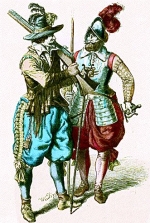|
It was the Battle of Rocroi [1] that was the turning point, thought Oliver Cromwell. With King Philip IV's army defeated he could no longer aid his thrice-cousin Emperor Ferdinand III. Yet the Hapsburgs held out vainly in hope of better terms. There had been some hard fighting. The rail lines of Germany were a ruin. The last three years of the War Oliver's own armored train 'Old Ironsides' had scarcely left its shed in Dresden as Oliver had led his Saxon army on horseback like a crusader of old.
Almost as hard as the war had been the peace. He had been here in Hesse-Nassau for the best part of a year. Finally the negotiations were at a conclusion, God be praised! Ferdinand would keep Hungary and Bohemia. Styria and Upper and Lower Austria would be given to the victors as reparations. France, Sweden and the remaining members of the Protestant Union had agreed that these prizes would be given to their soldiery. Similarly Salzburg would be divided into estates to be shared amongst the losing Imperial soldiers in lieu of pay. "Every man an Elector, indeed!" Oliver remarked.
Duke Maximillian of Bavaria was allowed to keep the Upper Palatinate to compensate for the loss of his electorship which had reverted to Charles Louis [2], and ostensibly to settle with his army. However Oliver suspected that the wily Duke had the wherewithal to pay off his troops and thus expand his duchy's borders.
Oliver felt that his time in exile on the Continent was nearing an end. Although he had won a sizeable estate in Upper Austria he did not think the life of a margrave would suit him. He had already heard some of the nobles at Hesse-Nassau whispering behind their hands about his Welsh origins and the events at Vienna. Let them think what they want, Oliver thought angrily, I am who I am - warts and all!
He had been keenly following events in his homeland. The pretense of a Council of Regency had collapsed. The Levelers, dominated by Fifth Monarchy religious fanatics had seized the government through an army they controlled imperfectly. Although a Puritan, Cromwell had no time for those who would prescribe the beliefs of others. Had he not said "Give me the liberty to know, to utter, and to argue freely according to conscience, above all liberties"? [3]
The country was falling into anarchy. A bad kind of anarchy. Very soon the people would welcome a man on a white horse. Or a man on the armored train 'Old Ironsides'.
George Monck, Cromwell's lieutenant, came over to where Oliver was sitting. The English general knew he would need Monck's services in the days ahead. Yet George was looking agitated. Oliver asked after his health but George went straight to the heart of the matter.
"Bohemia. It was the violation of Bohemia we fought against. Fighting for the right for her people to choose their own religion and ruler. Yet its seems for these princes 'convenient' that the forced exodus of the Protestants from her borders be allowed to stand; that the unfortunate nation be returned to the Jesuit backed rule of Ferdinand III. We fought for thirty years, Oliver, we fought for Bohemia. And this is the outcome! What of Bohemia?"
Oliver leaned back, his hands locked behind his head, "Ah, yes. Poor Bohemia!"
[To be continued]
| 
